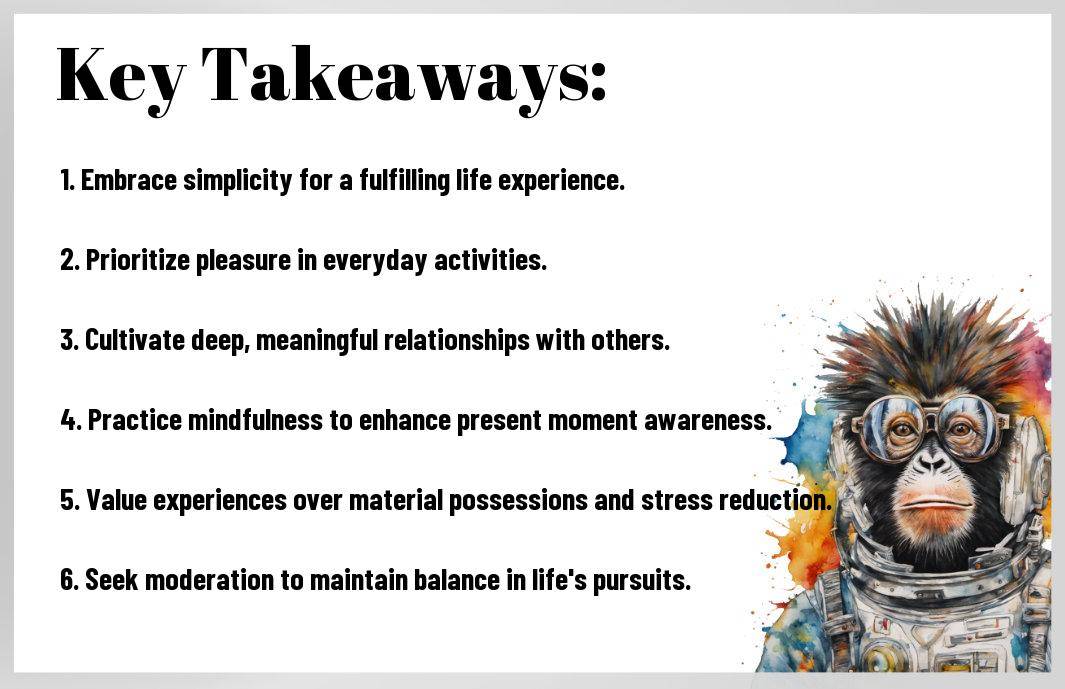Most of us encounter stress in our daily lives, and finding effective ways to manage it can feel overwhelming. I believe that by exploring Epicurean philosophy, we can learn how to embrace simple pleasures, cultivate meaningful connections, and find inner peace. In this post, I’ll share practical insights that can help you incorporate these ancient teachings into your modern lifestyle, ultimately leading to a more fulfilling and less stressful life. Let’s probe the wisdom of Epicurus together!

Key Takeaways:
- Pleasure: Embrace simple pleasures in daily life to enhance well-being.
- Mindfulness: Practice being present to reduce anxiety and enhance enjoyment.
- Nature: Spend time outdoors for its calming effects on the mind and body.
- Moderation: Adopt a balanced approach to indulgence to prevent excess stress.
- Community: Foster relationships with others to create support systems and reduce isolation.
- Reflection: Engage in self-reflection to understand and manage your emotions better.
- Acceptance: Embrace life’s uncertainties to cultivate resilience and peace of mind.

What is Epicurean Philosophy?
The essence of Epicurean Philosophy revolves around the pursuit of happiness and tranquility through simple pleasures and the avoidance of pain. Founded by the ancient Greek philosopher Epicurus in the 4th century BCE, this school of thought encourages us to seek joy and fulfillment from natural pleasures while also fostering meaningful relationships. It teaches us that true happiness does not come from material wealth or extravagant experiences, but rather from appreciating life’s simple joys, leading to a more relaxed and stress-free existence.
The Basics of Epicurus
One of the core ideas of Epicurus is that pleasure is the highest good. However, it’s important to realize that not all pleasures are created equal. Epicurus emphasized the importance of intellectual and emotional pleasures over physical ones, advocating for a life led by moderation and wisdom. The ‘hedonistic’ aspect of his philosophy is often misconstrued, as it does not suggest indulging in every desire, but rather finding joy in meaningful experiences and thoughts that nourish the soul.
Key Principles for a Relaxed Life
At the heart of Epicurean Philosophy lies the idea of reducing unnecessary desires and distractions to achieve inner peace. One of the key principles is the practice of moderation, where you learn to prioritize what truly brings you joy. By focusing on simple pleasures, like enjoying a good meal, spending quality time with friends, or indulging in nature, you can create a harmonious balance in your life that diminishes stress and enhances your overall well-being.
In addition, cultivating friendships and meaningful connections plays a significant role in this philosophy. Epicurus believed that strong bonds with others contribute to our happiness and can buffer us against stress and anxiety. By nurturing these relationships and surrounding yourself with supportive and like-minded individuals, you foster an environment where peace and joy can flourish, allowing you to embrace a more relaxed and fulfilling life.
Finding Pleasure in Simple Things
Now, as I commence on the journey of adopting Epicurean philosophy, I find that one of the most rewarding aspects is discovering joy in life’s simplest pleasures. By slowing down and appreciating the small things, I cultivate a deeper connection with my surroundings and with myself. Savoring every moment, from a warm cup of coffee in the morning to the sounds of nature outside my window, enriches my daily experience. It serves as a gentle reminder that happiness often lies not in grand experiences, but within the fabric of our everyday lives.
Embracing Mindfulness
Before I can truly appreciate the simple pleasures, I find that embracing mindfulness is imperative. By taking a moment to pause and breathe, I allow myself to fully engage with the world around me. This practice not only helps to clear my mind but also enhances my ability to enjoy even the smallest moments. Whether it’s focusing on the taste of my food, the warmth of the sun on my skin, or the laughter of a friend, being mindful transforms ordinary experiences into extraordinary ones.
Enjoying the Little Moments
After shifting my perspective towards mindfulness, I’ve begun to revel in the little moments that often seem insignificant. A walk in the park, the smile of a loved one, or even watching the clouds drift by can be deeply fulfilling experiences. It’s in these seemingly trivial occurrences that I find immense joy, allowing me to cultivate gratitude and contentment in my life. Each small moment I appreciate adds to a sense of well-being that makes daily stressors feel more manageable.
Consequently, I’ve learned that the little moments can be transformative when I focus on them. Just watching a sunset or savoring my favorite dessert becomes a celebration rather than a routine task. As I take these moments to heart, I discover that life is full of rich experiences waiting to be savored. In this fast-paced world, giving myself permission to pause and enjoy the now brings a renewed sense of peace and happiness into my life.

The Importance of Friendships
To truly embrace the essence of Epicurean philosophy, I believe we must acknowledge the significance of friendships in our lives. These connections not only enrich our existence but also provide a support system that helps reduce stress. The wonderful moments shared with friends—be it laughter, adventures, or heartfelt conversations—are what makes life delightful and meaningful. When we cultivate these bonds, we’re not only enhancing our own happiness but also lifting our friends up in the process.
Nurturing Connections
Across various life stages, I find that quality friendships become anchor points in navigating the ups and downs. Nurturing these connections requires intentional effort and openness. Whether it’s arranging a coffee date, a long phone call, or simply checking in through a message, I’ve learned that these small gestures can help sustain and deepen the bonds I share with my friends. It’s fulfilling to know I have a network where I can express my thoughts, share my joys, and seek comfort in tough times.
The Social Aspect of Happiness
For me, happiness is often a reflection of my social interactions. The joy that springs from shared experiences can light up even the darkest days. Engaging with others fosters a sense of belonging, which is vital to my well-being. When I surround myself with positive people, I notice that my outlook on life improves, making challenges seem more manageable. Friends remind me that I’m never alone in my journey, and their support helps me celebrate both the small victories and the big milestones.
In fact, studies show that social connections significantly impact our mental health and overall happiness. When I connect with friends, I feel a surge of positivity that helps balance out everyday stresses. Engaging in shared activities, whether through laughter or collaboration, can release endorphins, making me feel more alive. It’s these social interactions that contribute to a more fulfilled life, underscoring the Epicurean idea that pleasure—especially that derived from companionship—is a key component of happiness. By investing in my friendships, I’m not only nurturing those relationships but also cultivating a richer, more joyful existence.
Gaining Perspective on Pain and Fear
After exploring the roots of stress, I find it empowering to shift focus to how we can reshape our perception of pain and fear. Life often throws unexpected challenges our way, from personal setbacks to professional hurdles. By acknowledging that pain and fear are inevitable parts of the human experience, I can better navigate through them. This doesn’t mean I will no longer feel these emotions; instead, it allows me to accept their existence and understand that they can serve as catalysts for growth and resilience. Embracing this perspective sets the stage for discovering the valuable lessons that life’s challenges can bring.
Understanding Life’s Challenges
Above all, I believe that every challenge holds within it an opportunity for self-discovery and development. When I face difficult situations, I remind myself that pain can teach me about my values and priorities. Life is not always smooth sailing, and understanding this important truth helps me cultivate a more compassionate attitude towards both myself and others. In moments of discomfort, I challenge myself to reflect on what I can learn and how I can adapt, rather than viewing these experiences solely as setbacks.
Techniques to Overcome Anxiety
Challenges can elicit anxiety, but I’ve discovered several techniques that help me regain a sense of calm and balance. One of the first steps I take is to practice mindfulness. By being present in the moment, I can separate the reality of my situation from my fears. I often spend a few minutes focusing on my breath, allowing my thoughts to settle. Additionally, I embrace the power of positive self-talk; reminding myself of my strengths helps me face anxiety with renewed confidence. Journaling also serves as a great outlet for expressing my feelings and reflecting on my experiences, further easing my mind.
Another valuable technique I’ve found effective is physical activity. Engaging in exercise not only boosts my mood through the release of endorphins, but it also helps me channel the energy from my anxiety into something productive. Whether it’s a brisk walk or a fun dance session in my living room, moving my body makes a significant difference in how I process challenging emotions. Combining these techniques allows me to approach anxiety with a toolbox of strategies tailored to fit my needs, ultimately reducing stress and fostering a sense of peace in my everyday life.
Practical Tips for Incorporating Epicurean Ideas
Unlike what many people believe, embracing the Epicurean philosophy doesn’t mean indulging in excess. Instead, it’s about appreciating the simple pleasures in life that bring lasting happiness. To get started, consider implementing a few of these practical tips into your daily routine:
- Start your day with a moment of gratitude, reflecting on the things that brought you joy.
- Create a meal plan centered around fresh, wholesome ingredients that you genuinely enjoy.
- Set aside dedicated time each week for activities that make you feel relaxed, like reading or gardening.
- Practice mindfulness through meditation or yoga, focusing on your breath and the present moment.
- Connect with friends and family, nurturing relationships that enrich your life.
Any of these small changes can contribute to a more satisfying and stress-free lifestyle.
Daily Habits for a Calmer Mind
At the beginning of each day, I find it helpful to incorporate rituals that center my mind and promote a sense of calm. I like to engage in short mindfulness exercises, whether it’s sipping my morning tea slowly or taking a few deep breaths before jumping into my tasks. These practices serve as a reminder to slow down and appreciate the moment, helping me to maintain my focus on the simpler, pleasurable aspects of life throughout the day.
In addition, it’s beneficial to carve out a few moments in the evening for reflection. I often take notes in a journal, jotting down my thoughts about the day’s highlights and any positive experiences I’ve encountered. This helps me to cultivate a mindset focused on gratitude and contentment, key elements of Epicurean philosophy that effortlessly combat stress.
Creating Your Personal Epicurean Space
An imperative aspect of incorporating Epicurean ideas into your life is to create a personal space that nurtures your well-being. I believe that a comfortable and inviting environment can significantly enhance your ability to relax and enjoy life’s pleasures. To do this, I suggest surrounding yourself with items that inspire happiness, such as art, plants, or comforting furniture. A cozy nook for reading or enjoying a delightful cup of tea can become your sanctuary from daily stress.
Personal touches in your space are important; consider adding things that remind you of joyful moments or scents that make you feel serene. Soft lighting, a comfortable chair, or even a small water feature can help create an atmosphere that invites relaxation. You might also think about decluttering your surroundings to foster a sense of peace and simplicity. These enhancements will not only elevate your mood but will truly embody the essence of Epicurean living, making it easier to connect with the simple joys of life.
To wrap up
Presently, I find great comfort in embracing Epicurean philosophy as a way to reduce stress in my life. By focusing on simple pleasures, like enjoying good food, spending time with loved ones, and appreciating the beauty around me, I can create a more balanced and satisfying existence. It’s amazing how shifting my mindset can lead me to appreciate the little things that often go unnoticed. When I prioritize these simple joys, I notice that my stress levels drop significantly and my outlook on life improves immensely.
If you’re looking for guidance, I highly recommend checking out this article on Epicurus and Hedonism on How to Control the Overwhelmed …. It provides insightful perspectives on how to navigate through life’s challenges and design a fulfilling, stress-free experience. By exploring into these ideas, I believe you too can find your own path to tranquility and joy, making every day a little brighter.
FAQ
Q: What is Epicurean philosophy and how does it relate to stress reduction?
A: Epicurean philosophy, founded by the philosopher Epicurus, emphasizes the pursuit of happiness through the enjoyment of simple pleasures, friendship, and the cultivation of a tranquil mind. This philosophical approach teaches that by focusing on what truly brings joy and fulfillment, individuals can minimize stress and anxiety in their lives.
Q: How can the pursuit of pleasure help in reducing stress?
A: The pursuit of pleasure, as encouraged by Epicureanism, is about seeking those experiences that genuinely bring satisfaction and joy. Engaging in activities that promote happiness—such as spending time with loved ones, enjoying nature, or savoring good food—can shift focus away from stressors and foster a sense of well-being, thereby reducing overall stress levels.
Q: What practices of Epicurean philosophy can I implement daily to manage stress?
A: Practices include setting aside time for relaxation and self-care, prioritizing meaningful relationships, and enjoying moments of stillness or reflection. Creating a daily routine that incorporates simple pleasures, such as reading, meditating, or enjoying a favorite meal, can enhance your life experience and lower stress levels.
Q: Can Epicureanism help in understanding the origins of my stress?
A: Yes, Epicurean philosophy encourages introspection and examination of one’s desires and fears. By identifying what truly matters and where stress originates, individuals can better prioritize their activities and eliminate unnecessary pressures, leading to a more serene state of mind.
Q: How does the concept of friendship in Epicurean philosophy assist in coping with stress?
A: Epicurus taught that companionship and friendship are central to a fulfilling life. Strong social support can provide comfort during challenging times. Confiding in friends and sharing experiences can help alleviate feelings of stress, making it easier to navigate life’s ups and downs together.
Q: What role does mindfulness play in Epicurean stress reduction techniques?
A: Mindfulness aligns with Epicurean ideals by fostering an awareness of the present moment. By practicing mindfulness, individuals can enhance their appreciation of current experiences, reduce overthinking about past or future concerns, and cultivate a sense of tranquility, which is pivotal in managing and reducing stress.
Q: Is Epicurean philosophy relevant in today’s fast-paced world for stress management?
A: Absolutely! In a fast-paced world filled with distractions, the core tenets of Epicurean philosophy offer valuable insights into leading a balanced life. By prioritizing meaningful joys and focusing on the vitals, individuals can navigate modern stressors more effectively and find a path to greater peace and fulfillment.


